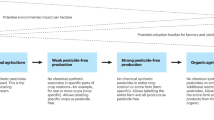Abstract
In many developing countries, incentives for pesticide use often conflict with efforts to ensure the rational and safe use of agrochemicals. This paper analyzes agricultural credit requirements that obligate farmers to use large inputs of pesticides. It discusses the rationale and background for these kinds of agrochemical incentives and gives specific examples of quantities of chemicals required from bank guidelines in Central America. It is argued that this policy is inappropriate for the interests of both farmers and the wider public, for several reasons, which are summarized. Policy changes, such as eliminating the requirements for chemicals and establishing incentives for Integrated Pest Management, are suggested in the final part of the article.
Similar content being viewed by others
References
Boardman, R., 1986,Pesticides in World Agriculture: The Politics of International Regulation, Macmillan, London.
Bottrell, D. G., 1983, “Social Problems in Pest Management in Developing Countries,”Insect Science and its Applications, 4(1/2) pp. 179–184.
Bull, David, 1982,A Growing Problem: Pesticides and the Third World Poor, Oxfam, Oxford, England.
Donald, Gordon, 1976,Credit for Small Farmers in Developing Countries, Westview, Boulder, Colorado.
Donald, Gordon, 1983, “Lessons from the Spring Review Workshops,”AID Spring Review of Small Farmer Credit, 20:6.
Feder, Ernest, 1976, “The New World Bank Programme for the Liquidation of the Third World Peasantry,”Journal of Peasant Studies, 3:3, pp. 243–54.
Goldberg, Karen, 1985, “Efforts to Prevent Misuse of Pesticides Exported to Developing Countries: Progressing Beyond Notification,”Ecology Law Quarterly, 1025–1050.
Gotsch, C. H., 1973, “Some Observations on the Small Farmer Credit Problem,” inAID Spring Review of Small Farmer Credit, 20:4.
Gotsch, C. H., 1974, “Credit Programs to Reach Small Farmers,”Development Digest, 12:1, Jan., 61–66.
Hansen, M., 1988,Escaping from the Pesticide Treadmill: Alternatives to Pesticides in Developing Countries, Institute for Consumer Policy Research, Consumers Union of the United States, Mt. Vernon, New York.
Kane, Edward, 1984, “Political Economy of Subsidizing Agricultural Credit in Developing Countries,” inUndermining Rural Development with Cheap Credit, Dale Adams, D. Graham, and J. D. Pischke (eds), Westview, Boulder, Colorado.
Lipton, Michael, 1976, “Agricultural Finance and Rural Credit in Poor Countries,”World Development, 4:7, pp. 543–53.
Nakhjavani, Mehran, 1977,Agrarian Reform in Latin America: The Role of Marketing and Credit, An Annotated Bibliography, Centre for Developing-Area Studies, McGill University, Montreal, Quebec.
Repetto, Robert, 1985,Paying the Price: Pesticide Subsidies in Developing Countries, Research Report No. 2, December, World Resources Institute, Washington, DC.
Thrupp, L. A., 1988a,The Political Ecology of Pesticide Use in Developing Countries: Dilemmas in the Banana Sector of Costa Rica, PhD. dissertation, University of Sussex, Brighton, England.
Thrupp, L. A., 1988b, “Pesticides and Policies: Approaches to Pest Control Dilemmas in Nicaragua and Costa Rica,”Latin American Perspectives, Issue 59, Vol 15 No 4, Fall, pp. 37–70.
Additional information
Lori Ann Thrupp is presently Program Director for Sustainable Agriculture (a senior associate) in the Center for International Development and Environment at the World Resources Institute. Previously (from 1988–90), she was a postdoctoral research fellow at the University of California, Berkeley (in the Energy and Resources Program) working on the political economy of natural resource management and sustainable agriculture in Central America. Her previous professional experiences include consulting, teaching, and research on natural resource issues and agroecology for organizations such as: Organization of Tropical Studies, International Institute of Environment and Development, Resources for the Future, U.S. Agency for International Development, Intermediate Technology Development Group, and the Worldwatch Institute. She has a PhD (1988) and MPhil (1983) in Development Studies (specializing in Natural Resource Management) from Sussex University, and a BA (1980) in Human Biology and Latin American Studies from Stanford University. She has received fellowships and scholarships from: Ciriacy-Wantrup Fellowship, Fulbright, Marshall, National Wildlife Federation, and Dudley Seers Fund. She is a co-author of a book entitledEl Uso de los Plaguicidas en Costa Rica, co-editor of a book entitledFarmer First: Farmer Innovation and Agricultural Research (with Robert Chambers and Arnold Pacey), and has many published articles in both English and Spanish. Her interests include occupational health and environmental policy, as well as resource management and sustainable agriculture/development.
Rights and permissions
About this article
Cite this article
Thrupp, L.A. Inappropriate incentives for pesticide use: Agricultural credit requirements in developing countries. Agric Hum Values 7, 62–69 (1990). https://doi.org/10.1007/BF01557311
Issue Date:
DOI: https://doi.org/10.1007/BF01557311




